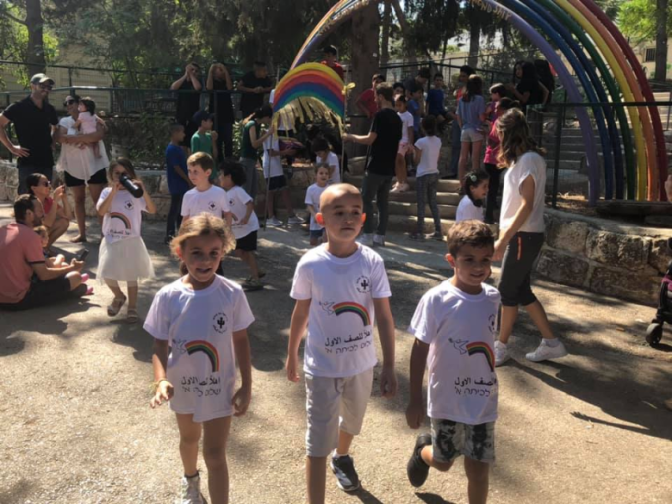Home > Oasis of Peace > Projects & Outreach > Children’s Educational System > The Opening of the 2019-2020 school year
The Opening of the 2019-2020 school year
Monday 16 September 2019

Larger than Ever!
With great excitement we have opened another school year: one, we hope that will be especially successful. With 314 children from kindergarten through sixth grade, and 11 classes at the primary school, this is our biggest year ever. Joining the school community are 54 new children at the first grade level. There will be 35 teachers, seven of which are new to the school.
New Curricula Launched
With the help of WASNS friends associations around the world and private foundations, our new curriculum for teaching culture and tradition classes was launched, after gathering together the study materials and completing almost all the translation work so that the curriculum is available in both Hebrew and Arabic. Our goals for this year are to translate the material into English, and to train the new teachers to use the textbooks and materials in which we have invested so heavily over the past three years.
We worked on the curriculum development together with the Center for Educational Technology, the country’s foremost developer of textbooks and teacher education websites. Working with the Education Ministry, the Center creates in-service teacher training programs for thousands of teachers. The Center will be helping us develop an interactive website that will make our new curricula available for use in ordinary schools throughout the country.
The Center for Educational Technology has a department for coexistence directed by Miriam Dramoni, who, together with WASNS communications and development director Samah Salaime, graduated from the Mandel Educational Leadership Institute.
Financial challenges
As reported in our May 30 newsletter from the Primary School, we have a serious difficulties in covering the school budget, due to a disagreement with parents over the amount of tuition fees that they will pay.
In previous years, when the school was a “recognized, independent school” we were permitted to charge expanded fees. After the school status changed, we continued to charge fees at a similar level. These are needed so that, taken together with donations, we can offset the cost of extra teaching hours for our bilingual teaching program, the library, school activities, transport coordination, and maintaining a Palestinian deputy principal (Reem Nashef). Although the change in status took place several years ago, during the 2018-2019 school year a group of parents campaigned to reduce the level of tuition fees, citing the Ministry guidelines. The Education Ministry permits fees to be charged for certain items, up to a certain amount, but we are not formally permitted to maintain tuition fees at our previous level.
In the 2018 – 2019 budget year, this produced a $130,000 deficit, which we were only barely able to survive. During the new school year, the rise in enrolment and teaching hours adds to the burden.
In order to offset the reduction in funding from tuition fees, we decided to ask a more realistic amount for transportation, which we were heavily subsidizing. Accordingly, we sharply adjusted the amount to NIS 6,800 per student per year. Needless to say, this was unpopular with parents, and negotiations are continuing. The problem is that, due to their geographical distance, those who pay most for transportation are those families with a weaker socio-economic level, particularly Arabs from Rame, Lydda and Ein Rafa. Some of these have said they may need to remove their children from the school.
The somewhat gratifying news is that the council in Mateh Yehuda has accepted our demand to cover transportation costs for those students who live within the council area itself (70 students). We will still need to support the 146 school children that need to be transported from outside the Mateh Yehuda regional council area (from the Ramla, Lydda, Modi’in, Gezer and Abu Ghosh council areas).
We are making every effort to resolve this economic crisis continue, however we will need your help.








